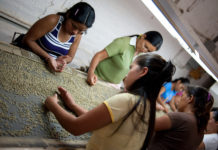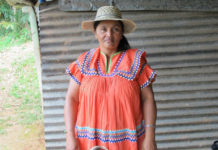
The trial of two former military officials accused of committing sexual slavery and forced disappearances during Guatemala’s civil war is due to start this week (February 1).
Former regional military commissioner Heriberto Valdez Asij and ex-base commander Esteelmer Reyes Girón are accused of crimes against humanity, alleged to have occurred in Sepur Zarco in northern Guatemala during the country’s 36-year civil war.
As reported by the U.S-based organization the Guatemala Human Rights Commission (GHRC), in 1982, the military built an army settlement in Sepur Zarco, where, over a six-year period, women from nearby communities were made to serve the soldiers. Forced to cook and clean, the women were repeatedly raped by soldiers during their three-day “shifts” at the military outpost for up to ten months.
Three decades later
After years of fighting for justice, the women who were victims of human rights abuses at Sepur Zarco have, along with the support of women’s organizations, brought two former army officials to trial more than three decades after the alleged violations.
An article in Open Democracy reports that a network of feminist organizations called the Alliance to End Silence and Impunity has been instrumental in helping to bring about justice. The organizations have worked with the women to collect and document testimonies, as week as helping to raise awareness of legal proceedings.
With the aid of the Alliance to End Silence and Impunity, in 2015, 15 women and five male witnesses began legal proceedings. Previously in 2014, two former army personnel were named and arrested. The trial is now going ahead after being initially stalled by legal challenges mounted by the defense.
A political science professor at George Mason University and senior fellow at the Washington Office on Latin America (Wola), Jo-Marie Burt, told the Guardian last week that “the women have worked with an amazing coalition of organizations over years to build the case in an effort to overcome the stigma and break the silence that so often accompanies sexual violence in armed conflict.”
“Weapon of war”
The Historical Clarification Commission (CEH) – created as part of the country’s 1996 Peace Accords to investigate human rights violations which occurred during the war –recorded 1,465 cases of rape. A total of 80 percent of the victims were indigenous Mayan women.
The International Justice Tribune reports that during the 2013 trial of former president Efraín Ríos Montt, experts testified that although rape had been used selectively to target women accused of belonging to guerrilla groups until 1979, by the 1980s it had become a “weapon of war”.
The CEH found that rape of women was common practice during the war and was “aimed at destroying one of the most intimate and vulnerable aspects of the individual’s dignity.”
“Those who survived the crime still suffer profound trauma as a result of this aggression, and the communities themselves were deeply offended by this practice. The presence of sexual violence in the social memory of the communities has become a source of collective shame,” reported the CEH.
The alleged Sepur Zarco human rights abuses occurred while Ríos Montt was Guatemala’s president, and in 2013, Ríos Montt became the first former head of state to have been taken to trial and be convicted of genocide and crimes against humanity in a domestic court. Just ten days later, however, the guilty verdict was overturned due to a legal technicality.
But, as the International Justice Tribune states, despite the overturned guilty verdict, the trial was a significant milestone and “acknowledged the sexual component of Guatemala’s armed conflict”.
This week’s trial against the two former army officials will be the first time that a case involving sexual slavery committed during an armed conflict will be heard in a domestic court.
Source: Latin Correspondent (Archived)





